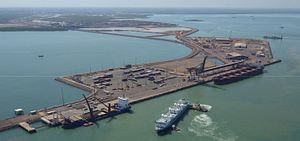In Australia, parts of the northern port of Darwin have been leased to a Chinese company for 99 years. This has sparked a firestorm of criticism in Australia media about the perceived security threat — a threat that is overblown and overhyped.
Two wharves in the port have been leased to a Chinese company called Landbridge. The company already operates in Australia, including Queensland. According to its website, “Landbridge Industry Australia Pty Ltd is a privately held Australian entity wholly owned by Landbridge Group Co., Ltd,” which is “a large scale privately owned enterprise based in Shandong Province of China.” It is hardly the most transparent company in Australia or the world.
Australia’s conservative print media outlet The Australian newspaper reported that “Landbridge is owned by Chinese billionaire Ye Cheng, who is a senior Communist Party official.” I would like to know which senior post he occupies in the Chinese Communist Party. He has acknowledged that he is a “National Committee Member of the Chinese People’s Political Consultative Conference and the Deputy of Shandong Provincial People’s Congress.” This does not equate to being a senior official of the Communist Party. Perhaps the newspaper has not noticed the anti-corruption campaign in China, which has seen the complete separation between billionaire status and holding a “senior position” in the Communist Party.
The Australian newspaper and other media sources, such as the Australian Financial Review, have reported that Landbridge is closely connected with the Chinese armed forces because it maintains militia units and even a communist party committee. Such connections are normal for big Chinese companies and mean little in terms of their international operations. These arrangements are largely for internal political control. Land-based militia personnel, barely trained, serve exclusively in their home provinces.
Australian Strategic Policy Institute (ASPI) director, Peter Jennings, has linked the proposed lease to concerns about the strategic balance in the South China Sea (See: “The Myth of a Strategic Imbalance in the South China Sea”). On November 13, Jennings, who has been leading the public charge against the government’s decision on the port lease, wrote with a co-author that “[i]n a worst case scenario, operational control of the Port of Darwin could facilitate intelligence collection.”
The commentators did not explain how the lease deal for two wharves gave the Chinese company “operational control of the Port of Darwin.” It clearly did not. As Trade Minister Andrew Robb observed (and was patently obvious to anyone with any knowledge of Australian law): “The fact of the matter is Defense has step-in rights, so if something happens for whatever reason and they want to take control of the port, they can.”
The good news is that Australia’s prime minister, Malcolm Turnbull, and other government ministers from defense to trade, do not agree with Jennings about the Darwin Port issue. After President Barack Obama unwisely raised the issue of undue Chinese influence in future military uses of the port of Darwin with Turnbull, the latter rather ebulliently dismissed the assertion as groundless.
Turnbull said: “The fact that Chinese investors were interested in investing in infrastructure in Australia is … hardly a secret.” He added, “And, under our legislation, the Department of Defense or this Federal Government can step in and take control of infrastructure like this in circumstances where it’s deemed necessary for purposes of Defense.”

































